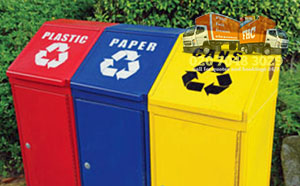Not many people think twice when carelessly tossing a tin can, a plastic bottle etc. in the rubbish bin. However, each time something is thrown out, there is less and less space left in landfills and tips – the importance of throwing a piece of rubbish in the bin, suddenly changes in perspective.
Rubbish is generated by each and every household in the UK. Authorities responsible for waste removal and processing from urban and suburban districts have come out with the figures – the average UK household generates over one ton of rubbish on an annual basis. This adds up to thirty one million tonnes for all households in the UK.
Effective waste removal and disposal practices are just the start. It is what happens to rubbish afterwards that’s important. In all cases, recycling of waste is the best way to deal with it. Recycling is the act of changing an unwanted item or material into a new, useful one. It is estimated that six out of every pieces of rubbish found in the average household bin can be recycled.
It seems waste removal authorities in the UK have their work cut out for them. A recent statistical research conducted by one of the main waste removal and management organisations in the country has returned some staggering figures. Here are some of the facts, which could be hard to stomach:
The average UK person throws out their own body weight in waste over a seven week period. Here it is from a different angle – every two hours, all people in the UK generate enough waste to fill up the Royal Albert Hall in London. This gives a whole new perspective to rubbish removal, doesn’t it?
 Rubbish removal, disposal and management are quite a costly exercise. Every year, England alone spends one point six billion pounds on waste removal and management. If the amount of waste generated was to drop, so would the costs for managing it – and that would be a proportionate reduction of both! The freed financial resources could be used for construction and management of newer, better and more efficient recycling and treatment facilities.
Rubbish removal, disposal and management are quite a costly exercise. Every year, England alone spends one point six billion pounds on waste removal and management. If the amount of waste generated was to drop, so would the costs for managing it – and that would be a proportionate reduction of both! The freed financial resources could be used for construction and management of newer, better and more efficient recycling and treatment facilities.
Rubbish removal authorities and waste management facilities have been voicing out against the use of plastic bags for years now. Plastic bags are bad news for the environment, and they eat up a lot of energy and resources to make. In the UK alone, a whopping thirteen billion plastic bags are thrown away unnecessarily every year. Only now are retailers and stores coming around and reducing the use of plastic bags through different means.
Official stats for the UK indicate that recycling rate in Britain is steadily improving with each year gone by. Ten years ago, the UK saw a decent growth in the percentage of recycled household waste – from nearly eighteen percent in twenty o three, to twenty four percent in twenty o five. Problems however appear with rubbish removal and recycling rates at a regional level. Some localities in the UK are lagging behind in these departments, whereas others are pioneering ahead.



